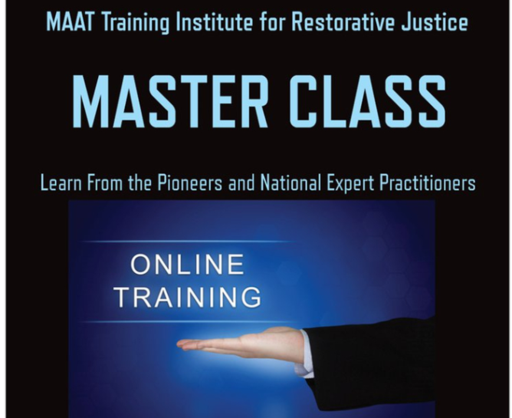Master Class
Youth and Families in Crisis, LLC invites you to engaged into the art of Restorative Justice Practices in our first online MASTER CLASS series. You will learn from the Pioneers and National experts on how to advance your knowledge, practice and skills in Restorative Justice and Restorative Practices.
Learn from some of the original writers, organizers, designers, educators and researchers in the field of Restorative Justice.

The MAAT Training Institute for Restorative Justice is sensitive to the growing trend of Restorative Practices, and limited access to quality training. It is our intention to provide easy access to experts in the field whenever and wherever it is convenient for you online.
Congratulations on taking this next step to invest in you, and your Restorative MIND journey!
This is an exclusive applicaiton process and requires an email of interest to:
admin@youthandfamiliesincrisis.com
You will receive a personal phone call from Dr. Ivy Hylton, LICSW, Ph.D., CEO/President of Youth and Families in Crisis, LLC, to discuss your career and professional development vision and plan.
The MASTER CLASS is designed for each member to join the "Circle of RJ Practitioners" and offers members opportunities for joining the MAAT consulting and training team.
MAAT MASTER CLASS
TRUTH * BALANCE * ORDER * HARMONY * LAW * MORALITY
Membership Description
This level of membership offers monthly group RJ coaching conference call, and 6 week on-line training program with weekly assignments. The on-line training program offers a video introduction of each area of expertise, (featuring the MAAT Expert and Pioneer), access to Master Class FaceBook Page, and self pace educational curriculum. Access to RJ Master Class Members Level I requires a pin number, assignment goggle drive link access, and access code.
All assignments will be posted on a google drive.
This level of membership offers monthly group conference call, 90-minute One-on-One Coaching session with MAAT Instructor of your choice, and 6 week on-line training program with assignments. Access to Master Class FaceBook Page, and self pace educational curriculum. Access to RJ Master Class Members Level II requires a pin number, assignment goggle drive link access, and access code. All assignments will be posted on a google drive. (If a student expresses interest in continuing one-on-one coaching with each expert, it is up to the expert to establish rates of service and level of care for each member.
This level of membership offers monthly group conference call, four (4) 90-minute One-on-One Coaching sessions with MAAT Instructor of your choice, and 12 week on-line training program with assignments. This is an extraordinary value for Manifest Members to take advantage of. Access to Master Class FaceBook Page, and self pace educational curriculum that covers every expert area practice. Access to RJ Master Class Members Level III requires a pin number, assignment goggle drive link access, and access code. All assignments will be posted on a google drive.
(Access to all Weekend Institute Retreats)
Balanced and Restorative Justice for Criminal and Juvenile Justice Training Curriculum
Balanced and Restorative Justice in Education for Schools Training Curriculum
• Review historical perspective of the evolution of restorative justice in education;
• Define retributive or traditional justice;
• Define restorative justice; and
• Understand the relationship with “Old Values” vs New Values
• Describe how restorative justice balances the three basic community
expectations: school community safety, accountability and competency development;
• Explain how balanced and restorative justice practices increase school community
safety;
• Describe how restorative accountability differs from the traditional concept of
accountability in juvenile justice; and
• Describe restorative justice competency development in education
• Restorative Practices Overview;
• Restorative Justice Models;
• Circle Simulation Exercise;
• Conferencing Simulation Exercise; and
• Accountability Board Exercise.
• Describe an approach to reintegration of students based on relationships;
• Explain the changing role of offender from villain/victim to resource to their
families and communities; and
• Build skills and connections based upon that changing role.
.
